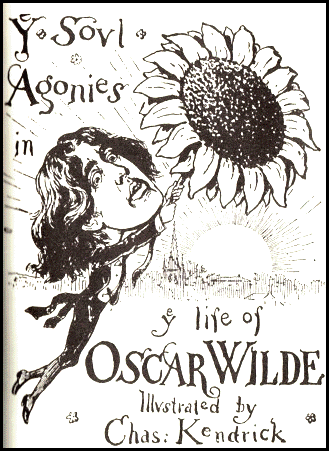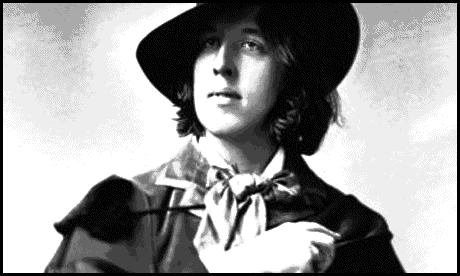In America
The Interviews
Matthew Hofer,
Gary Scharnhorst
Editors
(University of Illinois)

He also gave a hundred or so interviews to magazines and newspapers. There are forty-eight reprinted here, including ones published in such disparate journals as the New York Tribune, Philadelphia Inquirer, Boston Globe, Dayton Daily Democrat and the Halifax Morning Herald.
The fascinating thing for those of us in the 21st century is not the diversity of the writing, but its sameness. It is as if the writers had studied at the Victorian School of Uniform Journalism, reporting, dutifully, how they got up to his room, what Wilde looked like, what he was eating and drinking and wearing, how his face looked, how he lounged back on his bear-skin rug, how many cigarettes he smoked, his hair.
The questions they asked? It is almost as if they had also been given The Uniform Script: "What do you think of America?" "Why do you love sunflowers?" "What do you think of American artists?" "What do you think of America?"
But there is Wildean fun here, along with a fascinating undercurrent. Every one of his interviewers, it seems, in their portraits of him, made use of the word "feminine" or "effeminate." One speaks of his "lisp." The Rocky Mountain News reporter said
-
His face is long and oval in shape. He wears no beard or mustaches, his mouth is rather large and the lips are full and as bright colored as a girl's.
Obviously Wilde's reputation had preceded him. He had been subject to ridicule in Gilbert & Sullivan's operetta "Patience," where he appeared as --- spare us --- "Bunthorne." Obviously, long before 1953 (the date of the introduction of the world "gay" to our culture), America was waking up to the fact that there were men who lived by a different set of rules, and they (or at least one of them) were not shy and slim and retiring, hiding away. All reporters spoke with a certain anxiety if not puzzlement at Wilde's manly, six-foot frame.
Some of these reports carry an undertone of menace, and some a genuine pleasure in visiting with him. The ideas that Wilde expounded, and the reporters' view of him --- filtered through these reporters' words --- give us a peek into the late 19th century vision of those who are exotically if not dangerously different from your Victorian navvy.
Once in Wilde's hotel room, the reporter for the Charleston News and Courier "caught himself whistling the refrain which has of late become so popular,"
- Oscar dear, Oscar dear,
How utterly, flutterly utter you are;
Oscar dear, Oscar dear,
I think you are awfully wild, ta-ta.
And Wilde responded to his all-to-obvious gay-baiting by making a pointed answer to a question about "the love of the beautiful:" "I wish all other speculations were as harmless and as innocent." (The reporter states: "this was a propos of nothing.")
Another reporter, from the Halifax Morning Herald, is obviously smitten with Wilde, finds him "communicative and genial." Like all reporters, he notes Wilde's hair falling to his shoulders, which "when not looked after goes climbing all over his features." The poet uses the opportunity to talk about Americans who have managed to irk him: "I came out here, never having spoken in public in earnest about my message, strongly feeling what I was saying, and I talked seriously to those people."
- They heard me and went away and talked about my necktie and the way I wore my hair. I could not understand how people could do such a thing.

To those who were respectul, he opened up. We must regret that in the year 1882 there were no tape recorders nor DVDs so we could get to hear this nimble, playful, articulate, charming in-your-face aesthete express himself in his own words, with his own Irish/Oxonian accent.
Still, there are here enough of the Wildeisms that we can get a taste of his wit:
- When asked about his "private life," he said, "I wished I had one."
- On being questioned about what he would speak about when he gave his lecture on "The Decoration of Houses," he replied, "Well, it wouldn't be fair to tell you before I delivered my lecture. The subject covers an immense amount of ground, and I shall begin with the door-knocker and go to the attic. Beyond that is Heaven, and I shall leave that to the Church."
- On the Mississippi: "I think no well-behaved river would overflow as it has done, though I am quite willing to admit its beauty."
- When he received a telegram asking to lecture on aesthetics in Griggsville, Illinois, he responded, "Begin by changing the name of your town."
- When asked about his visit to Colorado, he said, "I spent a night in a silver mine. I dined with the men down there. They were great, strong, well-formed men, of graceful attitude and free motion. Poems everyone one of them. A complete democracy underground. I find people less rough and coarse in such places. There is no chance for roughness. The revolver is their book of etiquette.
And finally, after heading home: "America is the only country that went from barbarism to decadence without civilization in between."
As we read of him here, we would be remiss not to note that, despite the harsh prejudices of the times, he was courageous, willing to meet all comers, no matter how hostile, saying, "next to a staunch friend, the best thing that a man can have is a brilliant enemy."
We also can't help thinking of the tragedy that was to come, fed by his astounding pride. In a mere thirteen years, he would be overwhelmed by British Puritan moral code, laws enacted to destroy lives that many thought repulsive. His punishment would to strip him of everything --- money, power, fame, joy, and, they say, most tragically, his wit.
He would languish in Reading Gaol for two years, such that when he was released in 1897, he was a spectre, with only three years left to live, going off, most pathetically, with the man who had helped to destroy him.